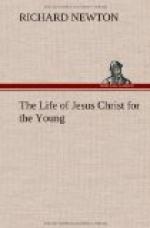“Henry Armstrong’s is the only one that is straight at all,” said Thomas Sanders.
“I don’t see how we all contrived to go so crooked, when the meadow is so smooth, and there is nothing to turn us out of the way,” said one of the boys.
And then, looking to their successful companion, they said—“Tell us, Harry, how you managed to make so straight a track?”
Now mark what Harry said:—“I fixed my eye on yonder tall pine tree on the other side of the fence towards which I was to walk, and never looked away from it till I reached the fence.”
The other boys were walking without any particular aim in view. No wonder that their walk was crooked. After the apostle Paul became a Christian, he made one of the straightest tracks through this world to heaven that ever was made. And he made it in just the same way in which Harry Armstrong made his straight track through that meadow. We have seen what Harry said of his track through the snow; now see what St. Paul says of the way in which he made his straight track through this world to heaven. This is what he says:
“One thing I do; forgetting those things which are behind, and reaching forth unto those things which are before, I press toward the mark, for the prize of the high calling of God, in Christ Jesus,” Phil, iii 13,14. This was just what the racer used to do in the ancient games, when he fixed his eye on the prize and pressed right forward till he reached it. And it was just what Harry Armstrong did in his play. He fixed his eye on the big pine tree and never turned to the right hand or to the left till he reached it. The apostle Paul fixed his eye on Jesus, and made a straight track through the world till he reached the glorious heaven where Jesus dwells. And, in doing this, the great apostle was only practising the lesson of duty taught by the voice that speaks from the Transfiguration scene. “Hear him,” said that voice. And if you and I listen to it, and obey it, as St. Paul did, it will lead us to follow him as he followed Christ; and then we shall make a straight path through this world to heaven, as he did in his Christian course. There is success in doing this.
And then there is—profit—in learning this lesson, as well as safety and success.
David says, when speaking of God’s commands, “In keeping of them there is great reward," Ps. xix: 11. This is true of all God’s commands; and it is especially true of the command we are now considering—“Hear him.”
Samuel obeyed this command, and it made him a blessing and an honor to the nation of Israel. David obeyed it, and it made him one of the greatest and most successful kings. Daniel obeyed it, and it covered him with honor, and made him a blessing to his own nation, and to the church of Christ in every age.




